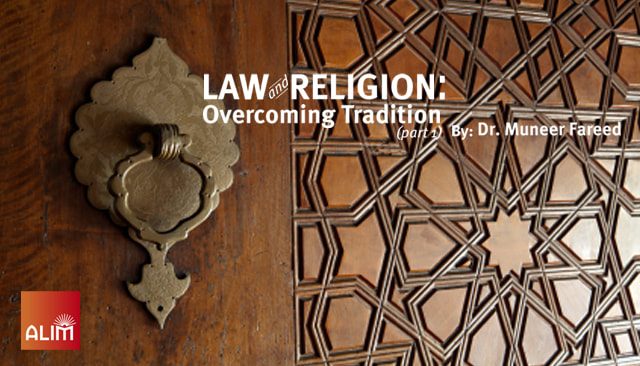|
What is it about law and religion that embroils jurists and theologians in deep, sometimes acrimonious discussions that critics say deliver less than was promised? Well, for one, they both make progress without making discoveries. Their aim, in other words, is rarely to unearth the unknown in their particular vocations, but rather, to focus on that which is familiar, and yet escapes notice. And that is not entirely an exercise in futility! To quote Wittgenstein, throwing a different light on the familiar, has epistemic value as well, if only because, “the aspects of things that are most important for us are hidden because of their simplicity and familiarity”. (One is unable to notice something – because it is always before one’s eyes). The other similarity that law and religion share, and upon which I will focus more attention—with particular reference to Islam—is that they are both in their own ways quite traditional. While both religion and the law are steeped in tradition, and both work towards preserving their respective traditions, only religion is generally labeled as such. As for law, ever since Hobbes, it has been described as living ‘time-free’ in an ever-present world of sovereigns, commands, sanctions, etc. But Martin Krygier, writing on the peculiarities of the law gives three reasons why the law is as much part past and part present. The first has to do with law’s historical substratum which is almost always anchored in some momentous past replete with revolutionary legal opinions that changed the course of human history. The second has to do with the authority tradition wields in the present, without which law can lay no claim to normativity or ‘ought-ness’. And the third—which is of particular interest to us—has to do with the powers that determine the authenticity and continuity of the tradition, and what passes from past to present, and more importantly what of the present is to be read into the past. In a democracy, we the people ostensibly determine what changes tradition undergoes, whereas in Islam it is supposedly the ʿulamāʾ. But authority today is being challenged at both ends by a cacophony of competing voices no longer willing to defer passively to any single authority. And then there is multiculturalism which today has so entangled the traditional authority of the ʿulamāʾ with secular society that both are forced to work out a modus vivendi. For the individual however, living this way, between past and present is, to say the least, quite stressful.
But the stresses suffered are surprisingly most evident, not under authoritarian regimes, but where secular democracies prevail. Minorities fleeing religious intolerance back home feel somewhat betrayed by secular civil society`s own intolerance towards their cultural practices. France, for instance, wants the hijab outlawed in public places, whereas Scandinavia wants a complete ban on circumcision. In both cases it would seem, it is not so much the demands of the secular law that faith based minorities fall foul of, but rather the secular traditions upon which civil society is based. In fledgling democracies, in Africa, and elsewhere, this is less the case for at least two reasons: firstly, the respect for, and immersion in indigenous traditions makes accommodating the Islamic tradition an affirmation almost of their own tradition. And secondly, Islam’s own amendments to local traditions have in time been so domesticated and indigenized as to become indistinguishable from local traditions. That this domestication of Islam is less successful in the modern world is according to some scholars the fault of the `ulama. In his study of Muslim societal development D.E. Smith concluded that Islam’s promise of material wellbeing, and societal felicity based on social justice, have been hobbled by its static legalism. According to Smith, this is because every effort to exercise Islam’s universal norms within given social paradigms has failed to “receive ecclesiastical recognition, legitimation and support.” Smith suggests that the blame lies with the custodians of Islam’s legal tradition, the ʿulamāʾ, and in particular, with their persistence in privileging tradition over change. Smith is certainly not the first to come to this conclusion: almost every other Muslim reformist from the past century and a half has in similar vein blamed the ʿulamāʾ for the Islamic world not abandoning obsolete traditions. That the Muslim world lags in terms of human rights and material progress is clearly evidenced by the endemic poverty Muslims suffer as a whole, and which Muslim women and children are forced to endure disproportionately. But to hold the ʿulamāʾ responsible for retarding social and material development is to misunderstand both their role in social transformation, or as custodians of the sacred law. End of Part 1 Email your comments and questions to [email protected].
0 Comments
Leave a Reply. |
|
stay connected
@alimprogram
PO Box 871785 Canton, MI 48187
(734) 956-0698
(734) 956-0698
2024 © American Learning Institute for Muslims. All rights reserved.
ALIM is a 501(c)(3) organization. All donations are zakat-eligible and tax deductible. Our EIN is 38-3633579.
Zelle: [email protected]
Terms of Service | Privacy Guidelines | Sign Up for ALIM Emails I Get ALIM Text Alerts
ALIM is a 501(c)(3) organization. All donations are zakat-eligible and tax deductible. Our EIN is 38-3633579.
Zelle: [email protected]
Terms of Service | Privacy Guidelines | Sign Up for ALIM Emails I Get ALIM Text Alerts


 RSS Feed
RSS Feed